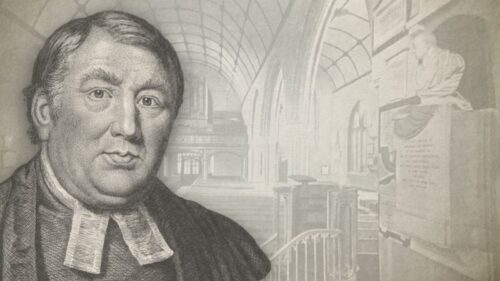
October 11—Morning Devotion
“He wakeneth morning by morning: he wakeneth mine ear to hear as the learned.”—Isaiah 1:4
Who is this but Jesus in his human nature, of whom the prophet speaks? Eminently to him doth it refer, to whom was given the tongue of the learned, that he might know how to speak a word to him that is weary. Precious Lord, it is indeed thy province, and thine only, to speak a word to weary souls, and to be the rest wherewith thou causeth the weary to rest, and to be their refreshing. Not only to give them rest, but thyself to be their rest. Not only to give them salvation, but thyself to be their salvation.—But, blessed Lord! May not a poor soul like myself say of thee also, that thou wakenest me morning by morning?—for who is it but Jesus, that, by the sweet influences of the Spirit, wakens his people morning by morning, and openeth the ear to hear, and the eye to see, and the heart to. feel the blessed tokens of his coming? Have I not found thee, Lord, wakening my soul sometimes before the dawn of day, and calling my soul up in gracious meditation, to attend to the soft whispers of thy love? Have I not heard thee saying, as to tile church of old, “Rise up, my love, my fair one, and come away?” And hast thou not made my soul, or ever I was aware, like the chariots of Aminadab? Do thou, Lord, waken me, I beseech thee, morning by morning, and while thou art thus speaking to my soul, let mine answer be, “My voice shalt thou hear betimes, Oh Lord, in the morning; early will I direct my prayer unto thee, and will look up. My soul shall wait for thee, more than they that watch for the morning, yea, I say, more than they that watch for the morning.”
Robert Hawker (1753-1827) was an Anglican (High-Calvinist) preacher who served as Vicar of Charles Church, Plymouth. John Hazelton wrote of him:
“The prominent features…in Robert Hawker's testimony…was the Person of Christ….Dr. Hawker delighted to speak of his Lord as "My most glorious Christ.” What anxious heart but finds at times in the perusal of the doctor's writings a measure of relief, a softening, and a mellowing? an almost imperceptible yet secret and constraining power in leading out of self and off from the misery and bondage of the flesh into a contemplation of the Person and preciousness of Christ as "the chiefest among ten thousand and the altogether lovely." Christ and Him crucified was emphatically the burden of his song and the keynote of his ministry. He preached his last sermon in Charles Church on March 18th, 1827, and on April 6th he died, after being six years curate and forty-three years vicar of the parish. On the last day of his life he repeated a part of Ephesians 1, from the 6th to the 12th verses, and as he proceeded he enlarged on the verses, but dwelt more fully on these words: "To the praise of His glory Who first trusted in Christ." He paused and asked, "Who first trusted in Christ?" And then made this answer: "It was God the Father Who first trusted in Christ."
Robert Hawker on the Biblical Covenants (Complete)
Robert Hawker's Poor Man's Morning Portions





